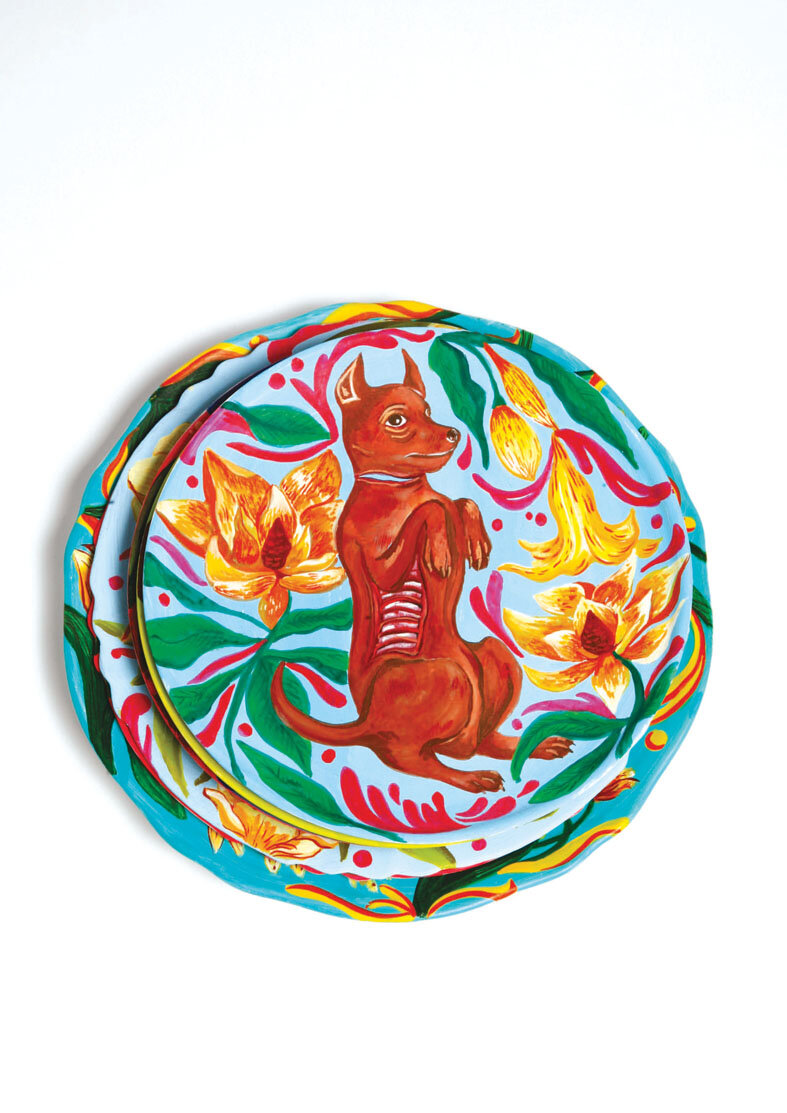Karina Tungari’s World of Meaningful Creativity
Image courtesy of Karina Tungari
When she was still living in Jakarta, Karina Tungari dreamed about traveling to faraway places and seeing the world. But she didn’t want to be just another tourist. Instead, she wanted to experience real life in another country by fully immersing herself in new surroundings and a different culture.
With a degree in visual communication design at Trisakti University in Jakarta under her belt, she knew that her parents wouldn’t be able to financially support her studies abroad.
“A family friend then told me about the possibility of becoming an au pair,” Karina recalled. “At the time, it was a fitting solution to fulfill my dreams, which was quite naïve, to be honest. I thought I just needed to get there first, and the rest would fall into place.”
This is how she eventually ended up in Hamburg, Germany more than a decade ago.
Fast forward to today, and Karina has fully arrived. Over the past ten years, she not only honed her skills as an illustrator and artist – she even continued her studies at the Hamburg University of Applied Sciences – but also took the time to think about her life’s journey.
These reflections are part of her book “Ahh… Das Gras auf der anderen Seite ist nicht immer grüner” (Ahh… The grass on the other side isn’t always greener), an autobiographical, illustrated essay, about her experience as an au pair during her first year in Germany – her expectations compared to reality and all the ups and downs she experienced.
The book was recently selected by Hamburg’s Agency for Culture and Media to receive a promotional prize: each year, the agency rewards writers and translators living in Hamburg. Karina was the first artist to win the award in the newly established comic category.
“The book was born from my desire to share my experience with people in Indonesia who are eager to move abroad, just like me,” Karina explained. “I hope that it can be published in Indonesia as well someday.”
Anke Feuchtenberger, who teaches drawing and graphic narration at the Hamburg University of Applied Sciences and was part of the jury, applauded Karina in her laudatory speech.
“In large-format, elaborately painted drawings and using an inventive typography, Karina Tungari shares the enthusiasm, joy, anger and disappointments she experienced during her the beginning of her stay in Germany, with humor, irony and tenderness,” she said. “Each picture in her graphic essay is so detailed that it is almost a short story in itself. ”
Image courtesy of Karina Tungari
Karina’s love for drawing began at a young age, she says, as is the case with many children.
“My mother always encouraged and supported me to further develop my skills, even as a kid,” Karina said. “She’d take me to drawing competitions for children every weekend. I never thought that this could become more than just a hobby, I just kept doing what I liked.”
Karina’s work can be found in several books and comic anthologies. She is also a regular contributor to Indonesian feminist online magazine Magdalene. Co-founder and Managing Editor Hera Diani said that she was immediately hooked when she first saw Karina’s portfolio.
“I love her style”, she explained. “It is very distinctive, has matured over time and lifts up our website. Her illustrations embody the very spirit of Magdalene: feminist, bold, daring, but also engaging, and the messages are subtle. We’ve been very happy with her works.”
The collaboration between Karina and Magdalene continues: they are now working together on a book about 100 extraordinary Indonesian women – the local version of “Good Night Stories for Rebel Girls”. According to Hera, Karina was her first choice to create the artwork – not only because of her obvious talent, but also for her impeccable work ethos and communication skills.
“I think she will go far,” Hera said. “She has what it takes to have a very successful global career.”
Karina herself remains humble. For now, she still enjoys life in Germany – less mosquito bites and ants than in Indonesia, she joked.
“Seriously though, living in Germany has taught me to have empathy, and it has given me time and space to clear my mind and become more self-reflective,” Karina explained. “Life here is more free and independent, and there are no mobility constraints because almost any place can be easily reached with public transport.”
In Indonesia, she continued, there is always some commotion, be it the street vendors, your neighbors or the sound of a bajaj passing by.
“It’s a very fast-paced and dynamic lifestyle, which maybe also makes it less boring,” Karina said. “If I should leave Germany at some point, the one thing I am going to miss most is probably to hang out with my friends in the park, laying low and drinking beer – things that are not always easy to do in Jakarta.”
Looking ahead, Karina can see herself moving to Bali in the future, perhaps opening a café or restaurant, while of course continuing to illustrate, draw and write – and most importantly, to share her skills with the Indonesian people.
This article was first published in the Jakarta Post on February 23, 2020.

